The software development landscape is undergoing a seismic shift, and at its epicenter is Artificial Intelligence. For software development businesses, AI is no longer a futuristic buzzword; it’s a powerful, accessible, and essential engine for growth. Companies that integrate AI into their workflows are not just coding faster; they are building better products, optimizing resources, and gaining an insurmountable competitive edge.

This comprehensive guide will explore the tangible ways you can leverage AI to scale your software development business. We’ll move beyond the hype to provide actionable strategies, highlight essential tools, and outline a roadmap for successful implementation. If you want to future-proof your business and unlock unprecedented levels of efficiency and innovation, the time to embrace AI is now.
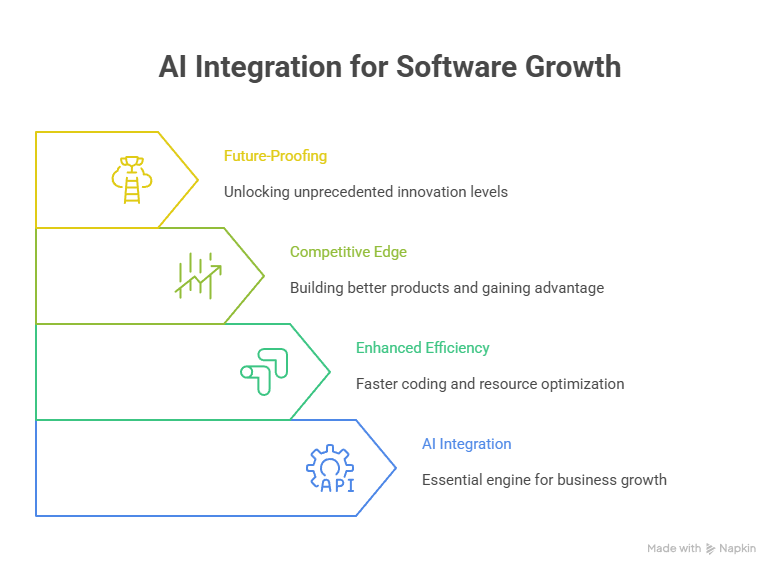
Why AI in Software Development is a Non-Negotiable for Growth
The traditional software development lifecycle (SDLC) is fraught with challenges: tight deadlines, unforeseen bugs, resource constraints, and the constant pressure to innovate. AI directly addresses these pain points by introducing a layer of intelligence and automation that was previously unattainable.
Key benefits include:
- Accelerated Development Speed: AI automates repetitive and time-consuming tasks, from writing boilerplate code to running complex test cases. This frees up your most valuable resource—your developers—to focus on high-level architecture, creative problem-solving, and feature innovation.
- Enhanced Code Quality: AI-powered tools can analyze code in real-time, identifying potential bugs, security vulnerabilities, and performance bottlenecks before they ever reach production. This proactive approach to quality assurance reduces technical debt and the costly process of post-launch fixes.
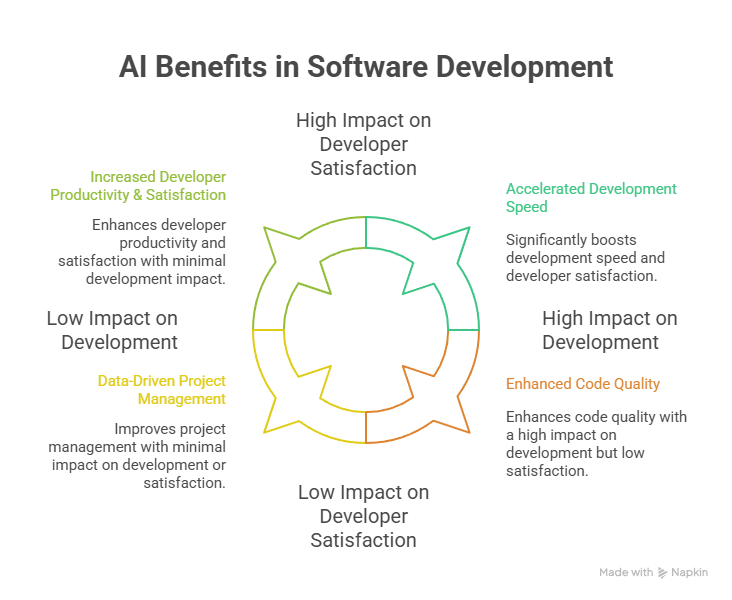
- Data-Driven Project Management: Say goodbye to guesswork. AI leverages historical project data to provide remarkably accurate predictions for project timelines, budget requirements, and resource allocation. This allows for smarter planning, reduced risk, and more transparent communication with clients.
- Increased Developer Productivity & Satisfaction: By handling the mundane aspects of coding, AI acts as a powerful co-pilot for developers. This not only boosts their output but also improves job satisfaction by allowing them to concentrate on more engaging and challenging work, reducing burnout.
Core Areas for AI Integration in Your Business
To truly harness the power of AI, you need to know where to apply it. Here are the most impactful areas where AI is revolutionizing software development today.
1. AI-Assisted Code Generation
This is perhaps the most well-known application of AI in development. AI code assistants are integrated directly into a developer’s Integrated Development Environment (IDE) and provide intelligent, context-aware suggestions.
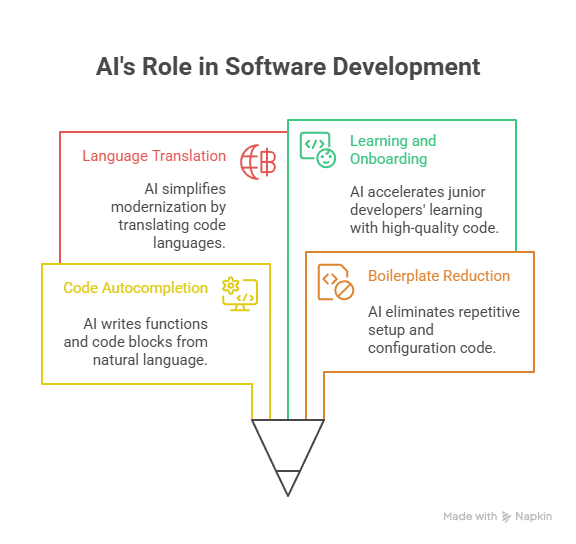
- Code Autocompletion: These tools go far beyond simple suggestions. They can write entire functions and code blocks based on natural language comments or the existing context of the code.
- Boilerplate Reduction: Eliminates the need to manually write repetitive setup and configuration code.
- Language Translation: Some tools can help translate code from one programming language to another, simplifying modernization projects.
- Learning and Onboarding: Junior developers can learn best practices and accelerate their learning curve by observing the high-quality code generated by AI.
2. Intelligent Testing and Debugging
The quality assurance (QA) phase is critical but often a bottleneck. AI-driven testing automates and optimizes this entire process.
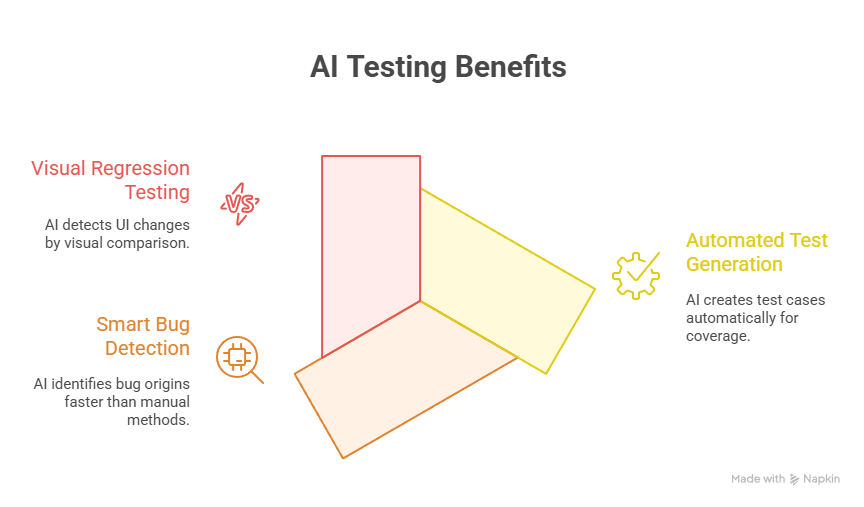
- Automated Test Case Generation: AI can analyze your application and automatically generate relevant test cases, ensuring comprehensive coverage.
- Smart Bug Detection: By analyzing patterns, AI can pinpoint the root cause of bugs with greater speed and accuracy than manual searching, drastically reducing debugging time.
- Visual Regression Testing: Tools can intelligently detect unintended UI changes by visually comparing different versions of a web page or application screen.
3. Predictive Analytics in Project Management
AI brings the power of big data to project management, transforming it from a reactive to a proactive discipline.
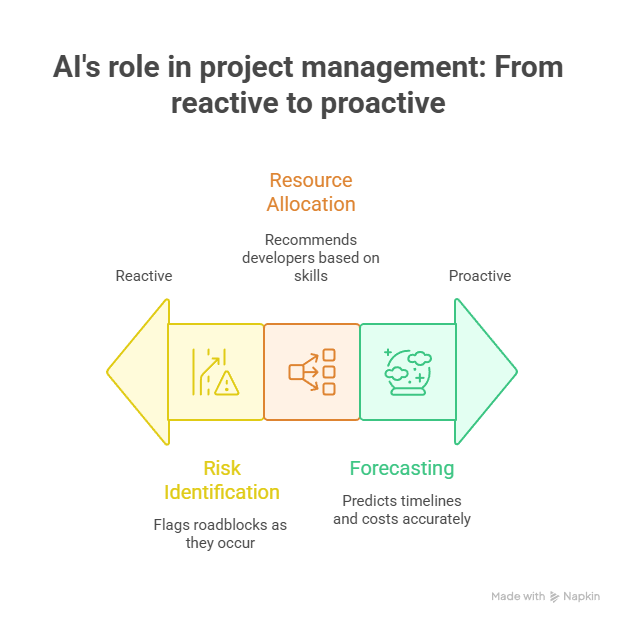
- Timeline & Budget Forecasting: By analyzing past projects, AI models can predict how long a new project with similar parameters will take and what it will cost, leading to more accurate quotes and realistic deadlines.
- Risk Identification: AI can flag potential roadblocks and risks early in the project lifecycle, such as a task that is falling behind schedule or a module that has an unusually high bug rate.
- Optimized Resource Allocation: AI can recommend the best developer or team for a specific task based on their skills, past performance, and current availability.
The Essential AI Toolkit for Software Development
The market for AI development tools is expanding rapidly. Here is a comparison of some of the leading platforms that can drive growth for your business.
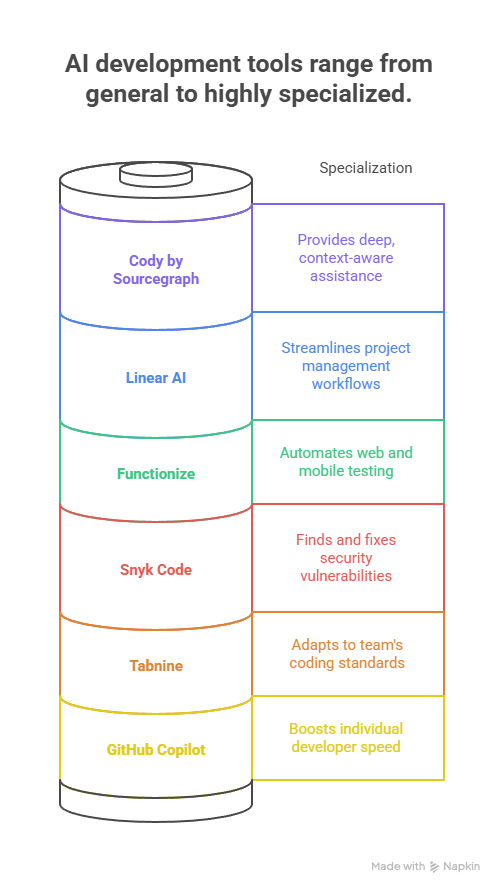
| Tool Name | Primary Function | Key Features | Ideal Use Case |
| GitHub Copilot | AI Code Completion | Context-aware code suggestions, natural language to code, IDE integration (VS Code, JetBrains) | General-purpose development across multiple languages; boosting individual developer speed. |
| Tabnine | AI Code Completion | Whole-line and full-function code completions, learns from your team’s code for personalization. | Teams looking for a personalized AI assistant that adapts to their specific coding standards. |
| Snyk Code | Code Security | AI-powered static analysis (SAST) to find and fix security vulnerabilities in real-time. | Businesses focused on building highly secure, enterprise-grade applications (DevSecOps). |
| Functionize | AI-Powered Testing | Natural language test creation, self-healing tests that adapt to UI changes, visual testing. | QA teams looking to automate web and mobile testing efficiently without heavy maintenance. |
| Linear AI | AI Project Management | Automated task triage, sprint planning assistance, predictive issue tracking. | Agile development teams aiming to streamline their project management workflows in Linear. |
| Cody by Sourcegraph | Code AI Platform | Understands your entire codebase, autocompletes code, answers questions about your code. | Companies with large, complex, or legacy codebases that need deep, context-aware assistance. |
Implementing AI: A Roadmap for Success
Adopting AI is a strategic journey, not a single step. Follow this roadmap for a smooth and effective integration.
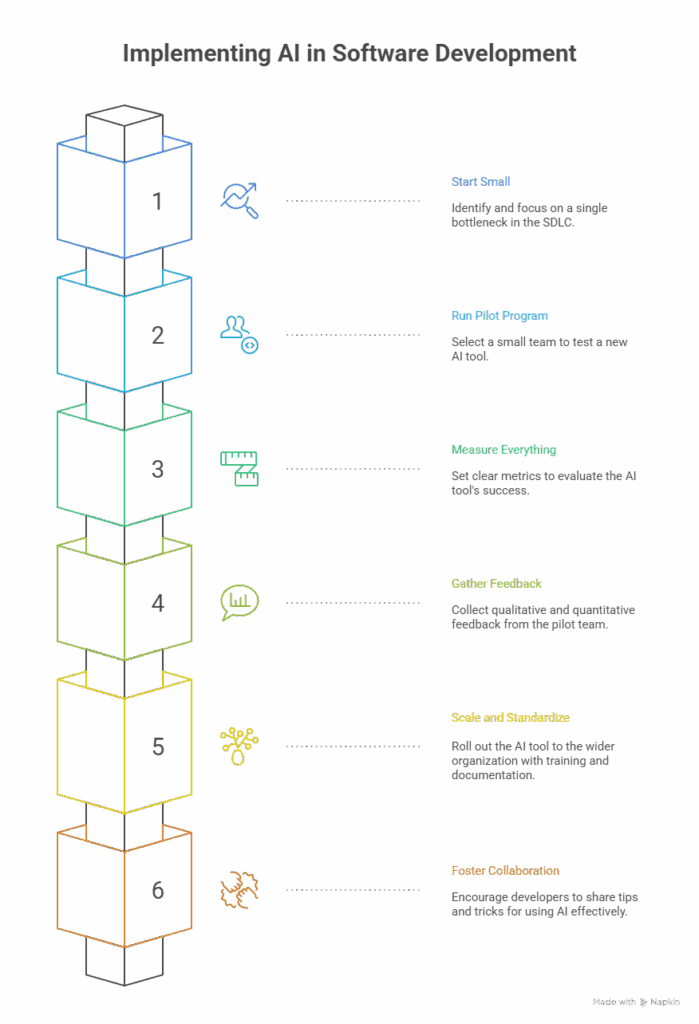
- Start Small: Don’t try to overhaul your entire workflow overnight. Identify the single biggest bottleneck in your SDLC. Is it debugging? Is it the initial code setup? Pick one area to focus on.
- Run a Pilot Program: Select a small, forward-thinking team to pilot a new AI tool (e.g., providing a GitHub Copilot license to a team of 3-5 developers).
- Measure Everything: Set clear metrics for success before you begin. This could be a reduction in time spent on a specific task, a decrease in the number of bugs reported, or faster ticket resolution times.
- Gather Feedback: The human element is crucial. Regularly check in with the pilot team to understand their experience. What do they like? What are the frustrations? This qualitative feedback is as important as the quantitative data.
- Scale and Standardize: Once you have proven the value of an AI tool in your pilot program, develop a plan to roll it out to the wider organization. Provide training, document best practices, and make it a standard part of your development toolkit.
- Foster a Culture of Collaboration: Frame AI as a collaborative partner, not a replacement. Encourage developers to share tips and tricks for using the new tools effectively. The goal is to augment human intelligence, not replace it.
The Future is a Human-AI Partnership
The fear that AI will replace developers is misplaced. The future of software development is a powerful symbiosis between human creativity and artificial intelligence. AI will handle the repetitive, the predictable, and the data-intensive, freeing human developers to do what they do best: innovate, strategize, and solve complex problems.
By embracing the AI revolution today, you are not just investing in a new set of tools. You are investing in a more efficient, more innovative, and more resilient future for your software development business. You are empowering your team, delighting your clients, and positioning your company as a leader in the next era of technology.










